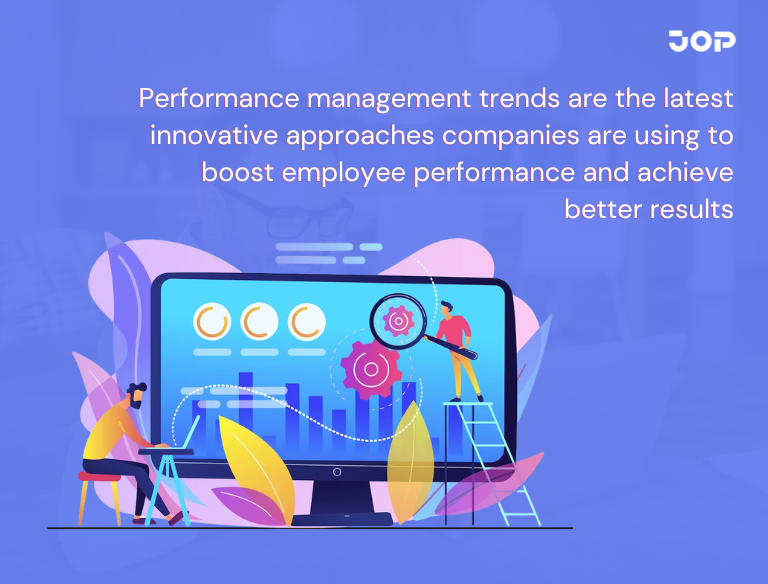Feeling a bit overwhelmed by the ever-evolving landscape of performance management Trends? Staying ahead of the curve can help you adapt faster to the changing workplace.
Let’s move on to the latest trends in performance management for 2023. We’ve done the research, so you don’t have to.
From AI-powered analytics to employee well-being strategies, you’ll discover real-world examples and actionable tips to keep your performance management on the cutting edge.

What are performance management trends?
Performance management trends refer to the latest developments and changes in the way organizations manage employee performance. These trends are driven by the need to improve employee engagement, productivity, and performance.
One of the most important trends is the shift from traditional annual reviews to continuous feedback and coaching. Organizations recognize the value of providing regular, real-time feedback to employees, fostering a culture of improvement and agility.
Another trend is the integration of technology, such as AI-powered analytics and performance tracking tools, which enables data-driven insights into employee performance and helps identify areas for growth.
As remote and hybrid work arrangements become more prevalent, adapting performance management practices to accommodate these new work dynamics is also a notable trend. This includes evaluating performance based on outcomes rather than mere presence.
Performance Management Latest Trends
1. Upskilling and reskilling
In an era where technology evolves faster than you can say “upgrade,” upskilling and reskilling have become your secret weapons. Say goodbye to static job roles and welcome the era of adaptable, versatile team members. The magic here lies in continuous learning. Encourage your teams to embrace upskilling – enhancing existing skills – and reskilling – acquiring new ones.
Think of it as your organization’s personalized hero training academy. Equip employees with curated courses, workshops, and mentorship programs tailored to their evolving roles. Embrace a growth mindset that celebrates curiosity and the courage to dive into uncharted territories.
2. Moving to continuous performance management
Imagine a world where feedback isn’t a once-a-year event but a continuous symphony. Welcome to the era of real-time performance discussions! This trend calls for more frequent check-ins, allowing managers and employees to collaborate on progress, goals, and areas for improvement. Say farewell to the anxiety-inducing annual review and embrace regular conversations that steer performance in the right direction.
Continuous Performance Management prepares your teams for high performance by training managers to be effective coaches and mentors, skilled in providing timely feedback and setting meaningful objectives. Create an environment where feedback isn’t just welcomed; it’s a catalyst for growth.
3. Enhancing data-driven performance management
It’s time to unleash the potential of data like never before. Performance management is no longer a shot in the dark; it’s an informed dance of insights. Embrace tools that gather and analyze performance metrics to create a clear performance picture. Identify trends, celebrate wins, and tackle challenges with precision.
As a team, delve into the metrics that matter most. Equip your managers with the art of turning data into actionable strategies. Foster a culture where data isn’t daunting but a guiding light toward success.
4. Increasing focus on employee well-being
Imagine a workforce that’s not just productive but genuinely thriving. Enter the era of holistic well-being. Recognize that peak performance isn’t achieved through burnout but through balance. Prepare your organization by valuing self-care as a vital component of performance. Encourage breaks, support flexible work arrangements, and provide resources for mental and physical wellness.
Cultivate an environment where employees feel safe discussing their well-being, removing any stigma surrounding the topic. Remember, a workforce that’s energized and resilient is your ultimate competitive advantage.
5. Rising adoption of performance management software and AI
A world where data-driven insights take center stage in shaping employee growth. Say goodbye to hunches and hello to precise strategies. Performance management in 2023 is stepping up with the power of AI and innovative software.
Think smart algorithms that help identify patterns in employee performance, providing actionable Performance Management feedback. To prepare your organization, embrace tech-savviness. Invest in user-friendly software that not only tracks performance but also offers intelligent suggestions for improvement.
6. More hybrid working
The era of 9-to-5 office monotony is fading fast. With hybrid work becoming the norm, performance management is redefining itself. The change? Shifting the focus from hours clocked to results achieved.
Employees will be assessed based on their outcomes, not just their physical presence. To adapt, foster a culture of trust and communication. Equip managers with skills to lead remote teams effectively and set clear performance metrics that transcend location.
7. Increasing expectations from managers
Managers in 2023 are the conductors of a symphony of success. They’re expected to be more than just supervisors; they’re coaches, mentors, and inspirations. Performance management will change by placing greater emphasis on manager-employee relationships.
Prepare your organization by investing in managerial training programs. Equip your leaders with emotional intelligence, communication finesse, and the ability to nurture talent. A team is only as strong as its leader.
8. Enhancing employee experience
Gone are the days of one-size-fits-all approaches. Employee experience is the heart of performance management.
In 2023, personalization is key. Tailor development plans to individual aspirations, strengths, and areas for improvement. To get ready, start by actively listening to your employees. Regular check-ins and feedback sessions will allow you to understand their needs, and co-create paths for growth that resonate with their unique journeys.
9. Emphasis on DEI (Diversity, Equity, and Inclusion)
Inclusivity isn’t just a buzzword anymore; it’s a driving force behind successful organizations. Performance management is evolving to ensure every voice is heard, appreciated, and empowered.
Expect more comprehensive evaluations that consider not only job performance but also contributions to a diverse and inclusive workplace. To be ready, educate your team on unconscious biases, foster open dialogues, and integrate DEI principles into your performance assessment framework.
Performance appraisal trends you should look out for Business Growth
1. Moving away from traditional performance appraisals
So, picture this: It’s 2023, and those big, scary annual performance reviews are becoming a thing of the past. Instead, we’re talking about having regular, friendly chats with your team. Think of it as those quick catch-ups over coffee rather than a formal interrogation.
Encourage these one-on-one meetings where you and your team members talk about their goals, how they’re doing, and any roadblocks they’re facing. Make it a habit, like a monthly or quarterly thing. And remember, it’s not just you doing the talking; encourage your team to share their thoughts on their own performance and where they see themselves heading.
2. Focus on employee development
In 2023, it’s not just about dwelling on the past; it’s about helping your team shape their future. Companies are all about nurturing their employees, not just pointing out what they did right or wrong last year.
To prepare for this, think about what skills your team needs to excel. Create personalized plans for each team member’s growth. Equip them with the resources they need to get better at what they do. Think about setting up mentorship programs or giving them access to cool online courses. The key here is to empower them to take the wheel on their own development.
3. 360-degree feedback
This is like getting a 360-degree view of your performance. In 2023, it’s not just the boss giving feedback; it’s everyone in your work sphere chiming in. Picture your peers, your team members, and sometimes even folks outside the company offering their insights.
To prepare, have a heart-to-heart with your team about why this is a good thing. Create an environment where people feel safe to speak their minds by keeping it anonymous and super confidential. And hey, show your team how to turn all this feedback into a tool for their own growth. It’s about learning and growing together.
4. BARS (Behaviorally Anchored Rating Scale)
This is about getting down to the nitty-gritty. Instead of vague ratings, BARS connects behaviors to those ratings, so it’s clear as day why someone got a particular score.
To prep for this, create some plain, simple descriptions of what good behavior looks like in your workplace. Train your managers to use these descriptions like pros. Encourage them to take notes throughout the year, capturing examples of these behaviors in action. It’s all about making evaluations more precise and useful.
5. Adopting performance management software
Think of this as upgrading your toolset for the digital era. In 2023, lots of companies are hopping onto the performance management software train to make things smoother.
To get ready, pick software that’s as easy to use as your favorite app. Teach your HR and management teams how to navigate it like pros. And don’t forget about security; make sure it’s locked down tight to safeguard your team’s info.
6. Psychological evaluations
So, in 2023, it’s all about digging into the psychology of your employees. You’ll want to understand how their emotions, stress management, and adaptability affect their performance.
To get ready, consider getting a pro psychologist or an HR whiz to create assessment tools. Then, make sure your managers are trained to read these evaluations like pros. They can use these insights to tailor feedback and development plans. It’s like peeling back the layers to see what makes your team tick.
7. Critical incident method
Now, here’s a neat one – the critical incident method. It’s making a comeback because it helps make performance assessments more real and actionable.
To prepare, ensure your managers are up to speed on how to use it. Encourage them to jot down both the good and not-so-good stuff that happens during the year. Also, consider investing in a handy platform to keep all these incidents organized. It’ll make appraisal discussions a breeze.
8. Emphasis on skills and competencies during hiring
In 2023, companies are finally getting the memo that what they hired for should match what they’re appraising for. It’s all about that alignment between recruitment and performance management.
To prep, team up with your HR and talent acquisition folks. Make sure the skills and competencies you looked for during hiring are right there in your performance appraisal criteria. Plus, whip up some training programs to help your folks level up those skills throughout the year.
9. Contextual performance management
Performance appraisals are getting a facelift, focusing more on where and how employees fit into the big picture. It’s not just about the numbers but how they adapt to the changing landscape and contribute to the company’s overall goals.
To get ready for this, start by defining what ‘contextual performance’ means for your crew. Teach your managers to have those regular heart-to-hearts with employees about their roles in the grand scheme of things. Invest in tools that help recognize and reward these contributions in real time.
10. Data-driven performance management
Data is the name of the game in 2023. You’ll be diving into analytics to spot trends, strengths, and areas where you can up your game.
To prepare, think about investing in some nifty data analytics tools that can talk to your performance management system. Train your HR and managers to be data wizards. And don’t forget about security – safeguarding employee data is a top priority.

Gaurav Sabharwal
CEO of JOP
Gaurav is the CEO of JOP (Joy of Performing), an OKR and high-performance enabling platform. With almost two decades of experience in building businesses, he knows what it takes to enable high performance within a team and engage them in the business. He supports organizations globally by becoming their growth partner and helping them build high-performing teams by tackling issues like lack of focus, unclear goals, unaligned teams, lack of funding, no continuous improvement framework, etc. He is a Certified OKR Coach and loves to share helpful resources and address common organizational challenges to help drive team performance. Read More
 Gaurav Sabharwal
Gaurav Sabharwal
